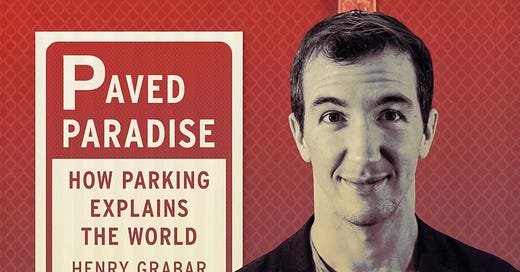Parking Wars
How Jockeying for a Spot is Shaping Our Cities and Driving Us Crazy
“Parking is the gritty gateway between driving and life itself—the nine-by-eighteen-foot battlefield where every inch is hard-earned, and every ding on the door tells a story. Whoever said life was about the journey, not the destination, never circled the block in search of a parking spot.” — Henry Gabar
I’ve been living the car-free dream since 2012, dancing joyfully past the traffic cops and flicking a metaphorical middle finger at parking meters. No more metal-to-metal combat, no more squeezing into spaces that seem better suited for compact sardine cans than compact cars.
My liberation from the four-wheeled grind has been a sweet escape from the grim fate of shattered mirrors and parking tickets as thick as my car manual.
For many, though, parking isn’t just a necessary evil; it’s a daily urban bloodsport, shaping both the contours of city life and the fragile egos of those who compete in its arena.
Enter Henry Gabar, whose book, “Paved Paradise: How Parking Explains the World,” goes deep into how this mundane act becomes a pivotal force in city planning, real estate battles, and everyday human survival.
Take my old friend Devorah, for example. She’s one of Boston's car-free warriors, navigating the busy streets of Brookline by foot where parking is a savage contest of wills.
Forget parallel parking—here, the challenge is finding a spot that doesn't cost more than a mortgage payment. And when Fall rolls around each year, and the student hordes descend on nearby Harvard, Boston College, and MIT, finding a parking spot is akin to winning the urban lottery.
The result? A multi-modal ballet that has people mixing cars, bikes, buses, and their own two feet, just to get from Point A to Point B.
Gabar gets it—he paints parking as the unsexy yet omnipotent overlord of city life. In urban jungles like Boston, Chicago, and L.A., parking dictates everything. It's the secret sauce (or perhaps the bitter seasoning) in the recipe of urban sprawl, where every decision, from the price of apartments to the width of roads, revolves around those sacred nine-by-eighteen feet of asphalt.
Imagine a city budget meeting where every debate circles back to parking: more spaces mean bigger buildings, more traffic, fewer bikes, more suburban creep, and a cityscape that’s less walkable, more bakeable—hello, heat islands!
In a place like downtown Sacramento, California where the Capitol dome looms over a growing metropolis, parking wars mirror the city’s own identity crisis. As developers dig up new ground, the race to park is on—whether it's squishing in more garages or persuading people to pedal to work in the scorching California sun.
Phoenix, Arizona Photo Credit: Diamond Michael Scott
And if you're Vinny Catalano of East Sacramento, you've seen it all: the cryptic signs that seem to be written in hieroglyphics, the parking garages that play hide and seek with your car, and the parking agents whose uniforms are like bullseyes for frustrated drivers.
As Gabar so brilliantly puts it:
“Driving into a new city, I often find street-parking instructions so unintelligible I might as well be trying to read a restaurant menu from twenty feet away, through a window, while steering the car. No aspect of American law is as scorned as parking regulations; no civil servant is as despised as the parking agent, which must be the only job whose workers say they cover up their uniforms to eat lunch, out of concern that someone will spit in their food.”
Just a short drive away in the city of Davis—college town, bike capital, and the land where parking angst meets its match—the dynamics are different but just as intense. The students of UC Davis flood the streets, and while the city promotes bikes as the transport of choice, the war over car space continues.
But the future, as Gabar speculates, may be a little brighter—or at least, more sci-fi. Imagine a world where self-driving cars drop us off and then head off to some far-flung car corral, freeing our cities from their asphalt handcuffs.
Sure, it sounds great until you realize that without a car to park, you might just end up in the suburbs anyway, living in some hyper-efficient, car-less utopia where your biggest worry is how to parallel park your electric scooter.
So, here’s the real takeaway from Gabar's work and my car-free, smugly liberating experience: Parking isn’t just about where to put your vehicle; it’s about how we choose to build, navigate, and ultimately, experience our cities.
As more people like me ditch the car keys for a metro pass or a pair of walking shoes, maybe we’ll finally understand that there’s more to life than finding a parking spot. Or, at least, we’ll all get really good at reading parking signs from twenty feet away.
Since January of 2020, Great Books, Great Minds has provided subscribers community, connection and conversation around books for free—no paywall.
But our future relies on you. At $6.00/month or $60.00 per year, please help me sustain our vision of impacting one million readers worldwide by 2030.
Diamond Michael Scott, Global Book Ambassador and Influencer







I enjoyed this well written book. Very current and eye opening. Parking is an issue that not a lot of people talk about. I wish I could give up my wheels also.. Thanks for recommending this book.
While my “to be read” table is at capacity at the moment, I enjoyed your assessment of this book. I especially enjoyed your opening about your car-free existence since 2012.
There is an interesting through line I’ve noticed on some of the topics you’ve presented recently. Homelessness recently, now Parking, Coffee Shops, your penchant for chatting with strangers. I feel like “Communities” are a theme. They’re so diverse, suburban, urban, some require a car. Others are walkable.